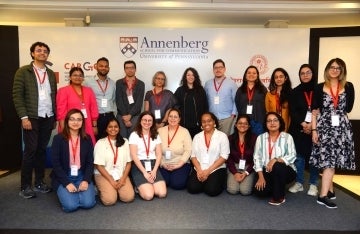Doctoral Student Tom Etienne Traces Public Opinion on Global Issues
Tom Etienne, joint doctoral student at the Annenberg School for Communication and the Department of Political Science, uses his skills in data collection to analyze political opinions.
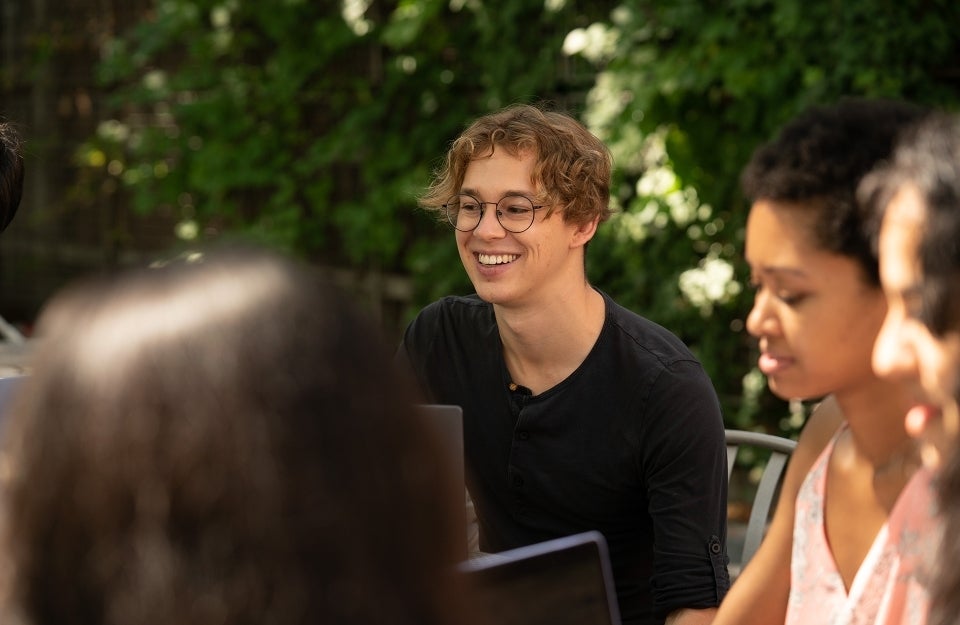
Tom Etienne with students from his cohort.
Tom Etienne is fascinated by public opinion.
For years, Etienne has spent his time developing tools to help voters compare their political views with those running for office.
Though Belgian by birth, Etienne, who is now a joint doctoral student at the Annenberg School for Communication and the Department of Political Science at the University of Pennsylvania, considers himself an honorary Amsterdamer. It was there that he earned a master’s degree from the University of Amsterdam and stayed to work with Kieskompas (Election Compass), a research institute that produces voting guides for the public.
At Kieskompas, Etienne developed over 30 online “election compasses” — interactive surveys that allow voters to compare their views on taxes, the environment, immigration, and other issues with those of candidates running for office.
At Annenberg, where Etienne is a first-year doctoral student, he is using these skills to analyze public opinion in the U.S. and Western Europe on a breadth of global issues — from conspiracy theories to nuclear disarmament.
From City Planning to Political Science
A lifelong city dweller, Etienne grew up in Leuven, Belgium, hoping to become an urban planner. He majored in transportation science as an undergraduate at Hasselt University and began to learn the ins-and-outs of shaping public space.
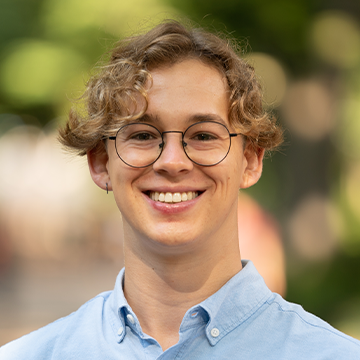
As he progressed toward graduation, Etienne’s interests shifted away from city planning. He spent a semester abroad and dove into the social sciences.
“I gradually grew more and more interested in political science,” he says. “I decided to write my bachelor’s thesis on how politicians talked about public transport.”
This led to a master’s program in political geography and, soon, Etienne was at Kieskompas, analyzing the Dutch public’s political opinions.
Creating Compasses to Guide Voters
The election compasses Etienne created at Kieskompas resemble a BuzzFeed quiz, but instead of determining which White Lotus character you are or which Pop Tart flavor matches your personality, these questionnaires show users where they fit in the political landscape of their town, province, country.
Using a scale from strongly disagree to strongly agree, the surveys ask people’s opinions of statements like: “Taxes on the wealthy should be increased” and “Business owners must be able to refuse customers who have not been vaccinated against COVID.”
Results are presented as an interactive graph representing the political spectrum — with conservative to progressive on one axis and economically right to economically left on the other. The user is shown their coordinates on the graph and those of various candidates.

Over eight million voters have used election compasses designed by Etienne to guide their election day decisions.
From Amsterdam to the Keystone State
Etienne spent a year in Pennsylvania before he began his doctoral program at Annenberg, working with Sona Golder at The Pennsylvania State University. With Golder, he worked on the InstaParty Project, a study on political party instability in European parliaments.
“The InstaParty project maps instability in European parliaments — when members of parliament switch parties, when parties collapse or emerge, and so on,” Etienne says. “My job consisted of going through archives of the Dutch parliament as well as other sources such as media articles to list all party switches since roughly the 1960s.”
Mapping these changes was almost like taking part in a political reality show, Etienne says, since many party switches were driven by internal disagreement and petty disputes.
When it was time to transfer from Penn State to Penn, in true Amsterdam-style, Etienne got on his bike.
He rented a car to move his belongings from State College to Philadelphia, but couldn’t fit his bike. After returning the car in State College, he cycled over 50 miles, taking in the sights of the Schuylkill River Trail.
“It was such a beautiful ride and I have fond memories of biking through the Appalachian and Amish country, having lunch in the field, at a creek, in a small-town diner, and getting very, very sunburnt,” he says.
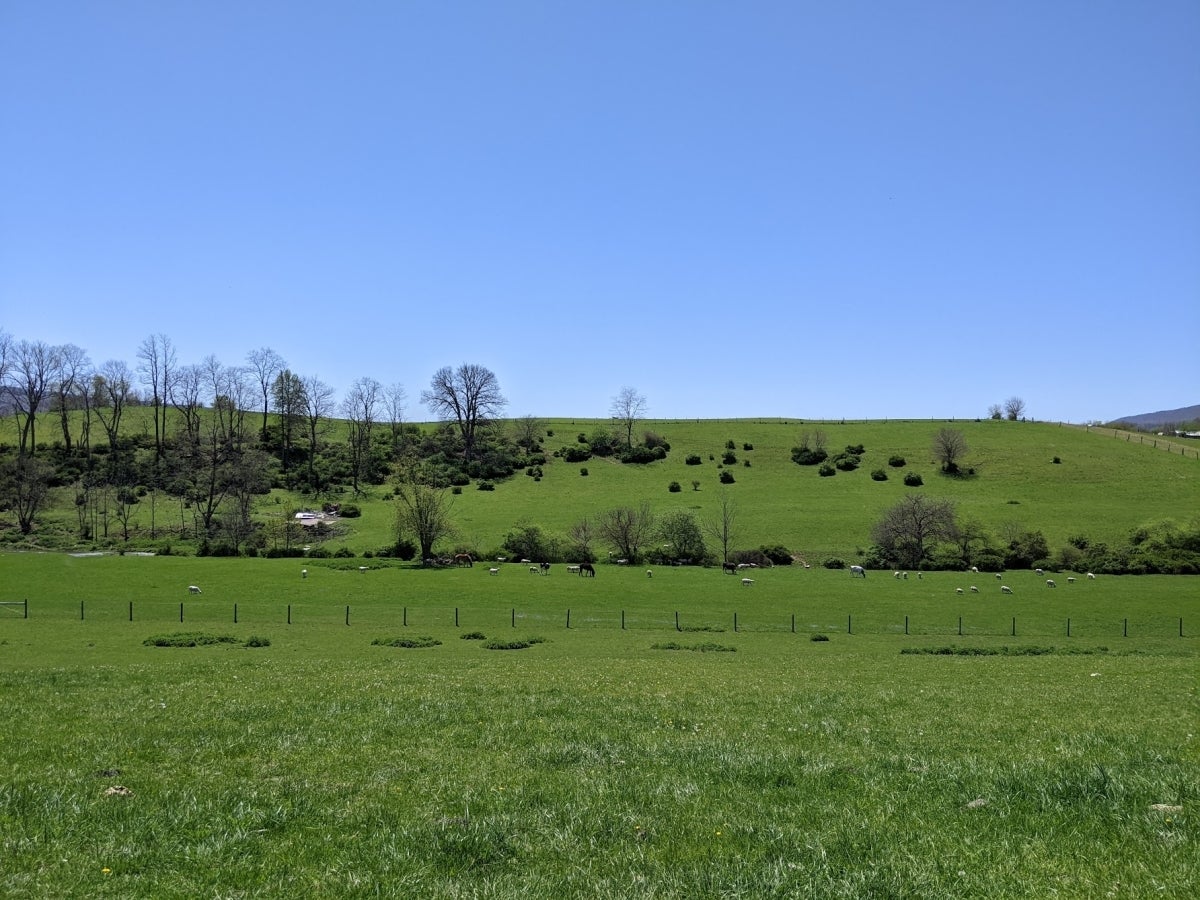
Finding His Feet (and Research Agenda) in Philly
Now at Annenberg, Etienne is diving into coursework — a joint doctoral program takes a lot of studying — and sorting out his personal research agenda.
“I am lucky because at Kieskompas I had access to so much data, because that's what we did, we collected data. I was on research projects with other academics in the US and in Europe and gained research experience,” he says. “Now I have to focus on my own research agenda and create my own coherent stream of research.”
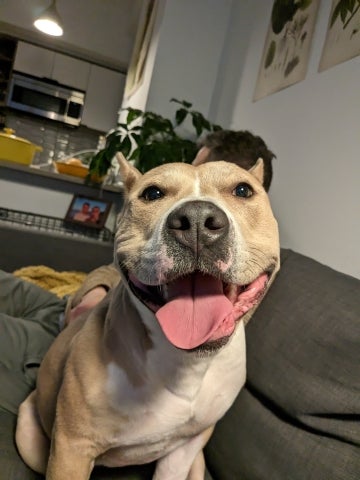
His doctoral cohort has profoundly helped with the transition to a new city and a new university, he says. Even though he already had a connection in Philadelphia when he arrived in the city — his long-term partner is in a doctoral program at Penn — it has been comforting to have a group of friends with whom he can share ideas, explore the city, and relate to, he says.
His cohort has even gone camping together in the Poconos since starting at Annenberg in the fall.
“Even though my research tends to be more political science than communication, I feel very close to the people here at Annenberg,” he says. “I’m here every day.”
When Etienne isn’t studying, he’s swimming, cycling, or spending time with his partner and their foster dog, Lillian.
Etienne hopes Lillian will find a good home in the City of Brotherly Love. She is up for adoption through Morris Animal Rescue. You can follow her Instagram at @lilly.in.philly.



